Reflections in a Golden Eye
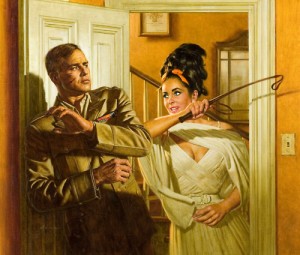 The alcohol lobby used to be much more powerful. Now they can only advertise at certain times on TV. Of course, with the stigma of drinking now attached to the notion that alcoholism is a disease; it’s certainly less glamorous to get publically plastered, and more likely to have you wake up on an episode of Intervention. But in the 1930s, right after prohibition was lifted; binge drinking was a problem, as detailed in Charles R. Jackson’s novel The Lost Weekend. When Billy Wilder tried to adapt the book into a movie, Paramount was hesitant, especially as alcohol lobbyists put pressure on them, rightly believing it would make drinking look less than savory.
The alcohol lobby used to be much more powerful. Now they can only advertise at certain times on TV. Of course, with the stigma of drinking now attached to the notion that alcoholism is a disease; it’s certainly less glamorous to get publically plastered, and more likely to have you wake up on an episode of Intervention. But in the 1930s, right after prohibition was lifted; binge drinking was a problem, as detailed in Charles R. Jackson’s novel The Lost Weekend. When Billy Wilder tried to adapt the book into a movie, Paramount was hesitant, especially as alcohol lobbyists put pressure on them, rightly believing it would make drinking look less than savory.
The film was eventually distributed in 1945, winning Oscars for best picture, best director for Wilder, best screenplay, and best actor for Ray Milland, but with a key adjustment made to the story. Originally, the main character was tortured by the memory of a homosexual incident he partook in during his college years. The filmed version changed the homosexuality to writer’s block. Whether that was a nod at the inability for Wilder to properly express what was really going on, is unclear, but it’s a common theme among films of that era. 1958’s adaptation of Tennessee Williams play Cat on a Hot Tin Roof flops around like a dead fish trying to distract you from its gay subtext, but the covering up of material that was acceptable on stage, turns the film into overwrought melodrama. The production code was constantly getting in the way of expression, and so filmmakers like Alfred Hitchcock (Rope) could only hint here and there, which might have gone over the heads of less sophisticated viewers.
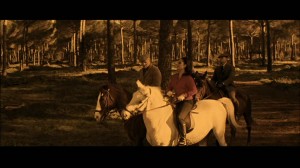 But as society began to loosen up, so did the production code’s stranglehold on Hollywood films. By the 1960s, you could have gay characters, but they would inevitably be punished, or they would spend the entire film contemplating suicide because of their preferences. When the MPAA rating board was created in 1968, a voluntary rating system that still exists, restrictions on subject matter relaxed. But there were many film made before 1968, films like Bonnie and Clyde and Who’s Afraid of Virginia Woolf that, while tame today, contained inflammatory material that sparked the need for more leeway for filmmakers.
But as society began to loosen up, so did the production code’s stranglehold on Hollywood films. By the 1960s, you could have gay characters, but they would inevitably be punished, or they would spend the entire film contemplating suicide because of their preferences. When the MPAA rating board was created in 1968, a voluntary rating system that still exists, restrictions on subject matter relaxed. But there were many film made before 1968, films like Bonnie and Clyde and Who’s Afraid of Virginia Woolf that, while tame today, contained inflammatory material that sparked the need for more leeway for filmmakers.
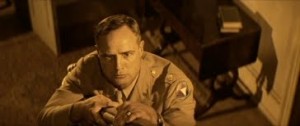 There was a period in 1966-1967 when certain films were given released with a warning, suggesting that they were intended for adult audiences (like a hard PG rated film, such as Jaws and Raiders of the Lost Ark). One of these films, John Huston’s adaptation of Carson McCullers’ novel Reflections in a Golden Eye, dealt with homosexuality in a way that was common to the 1960s theme of repression and self-hatred. In the film, which takes places in Georgia in 1948, an army major played by Marlon Brando, yearning for his care-free days as a young military recruit, points his disgust inwards while he outspokenly decries any behavior that veers away from the norm. He lusts after the frequently nude young officer played by Robert Forster, but he cannot express it except by beating the favorite horse (pre-dating Equus, Peter Shaffer’s play with similar subject matter, by several years) of his philandering wife played by Elizabeth Taylor.
There was a period in 1966-1967 when certain films were given released with a warning, suggesting that they were intended for adult audiences (like a hard PG rated film, such as Jaws and Raiders of the Lost Ark). One of these films, John Huston’s adaptation of Carson McCullers’ novel Reflections in a Golden Eye, dealt with homosexuality in a way that was common to the 1960s theme of repression and self-hatred. In the film, which takes places in Georgia in 1948, an army major played by Marlon Brando, yearning for his care-free days as a young military recruit, points his disgust inwards while he outspokenly decries any behavior that veers away from the norm. He lusts after the frequently nude young officer played by Robert Forster, but he cannot express it except by beating the favorite horse (pre-dating Equus, Peter Shaffer’s play with similar subject matter, by several years) of his philandering wife played by Elizabeth Taylor.
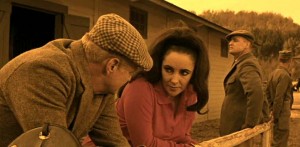 Brando knows that Taylor is cheating with his friend, played by Brian Keith, but chooses to ignore it, because he believes that, like his own sexuality, if it’s never spoken aloud, then it never happened. Keith’s wife, Julie Harris, who has already engaged in a desexualizing form of self-mutilation as a way to punish herself for the death of her child, spends all her time with Anacleto, her gay Asian houseboy. They try to find a way to establish a new life, off of the isolated military base. Other men struggling with their sexuality, about to be forced out of the military by their commanding officers, seek her help, but she’s established her own personal hell with agoraphobic behavior in her bedroom.
Brando knows that Taylor is cheating with his friend, played by Brian Keith, but chooses to ignore it, because he believes that, like his own sexuality, if it’s never spoken aloud, then it never happened. Keith’s wife, Julie Harris, who has already engaged in a desexualizing form of self-mutilation as a way to punish herself for the death of her child, spends all her time with Anacleto, her gay Asian houseboy. They try to find a way to establish a new life, off of the isolated military base. Other men struggling with their sexuality, about to be forced out of the military by their commanding officers, seek her help, but she’s established her own personal hell with agoraphobic behavior in her bedroom.
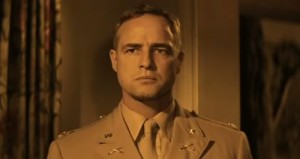 All of this material should be plenty for Huston, but his approach, while daring for the time, shows a lack of confidence. He opens the film with a plucky, leering score, as if to hint that the movie will be seamy and drenched in scandal, but still acceptable for, you know, classy people. When we first see Brando, he’s awkwardly lifting weights, angling them in the least “manly” way possible. The sepia-tone photography of the film, which after audience confusion, was re-colored by the studio upon its original release, but was restored for the DVD in 2006, is suffocating enough, there’s no need to hammer home how much Brando is struggling with his sexuality. Huston even lays out the “perverts” and the “normal heterosexuals” in symmetrical fashion, each group only socializes with each other, so there’s never any confusion for us. The title refers to the same idea, the “grotesque” representations constantly watch over each other (Forster isn’t just a bare-horsebacking nudist, but a lecherous voyeur too). Huston is very careful not to share any beauty with us, there’s one stunning shot of swirling dust, accentuated by the golden hue, but it’s far off in the distance. If the characters can’t have pleasure, neither should we.
All of this material should be plenty for Huston, but his approach, while daring for the time, shows a lack of confidence. He opens the film with a plucky, leering score, as if to hint that the movie will be seamy and drenched in scandal, but still acceptable for, you know, classy people. When we first see Brando, he’s awkwardly lifting weights, angling them in the least “manly” way possible. The sepia-tone photography of the film, which after audience confusion, was re-colored by the studio upon its original release, but was restored for the DVD in 2006, is suffocating enough, there’s no need to hammer home how much Brando is struggling with his sexuality. Huston even lays out the “perverts” and the “normal heterosexuals” in symmetrical fashion, each group only socializes with each other, so there’s never any confusion for us. The title refers to the same idea, the “grotesque” representations constantly watch over each other (Forster isn’t just a bare-horsebacking nudist, but a lecherous voyeur too). Huston is very careful not to share any beauty with us, there’s one stunning shot of swirling dust, accentuated by the golden hue, but it’s far off in the distance. If the characters can’t have pleasure, neither should we.



